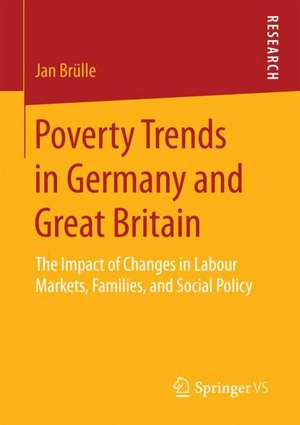Poverty Trends in Germany and Great Britain: The Impact of Changes in Labour Markets, Families, and Social Policy
Autor Jan Brülleen Limba Engleză Paperback – 7 feb 2018
Preț: 453.78 lei
Nou
Puncte Express: 681
Preț estimativ în valută:
86.84€ • 89.71$ • 72.27£
86.84€ • 89.71$ • 72.27£
Carte tipărită la comandă
Livrare economică 26 martie-09 aprilie
Preluare comenzi: 021 569.72.76
Specificații
ISBN-13: 9783658208912
ISBN-10: 3658208910
Pagini: 316
Ilustrații: XVI, 319 p. 34 illus.
Dimensiuni: 148 x 210 mm
Greutate: 0.4 kg
Ediția:1st ed. 2018
Editura: Springer Fachmedien Wiesbaden
Colecția Springer VS
Locul publicării:Wiesbaden, Germany
ISBN-10: 3658208910
Pagini: 316
Ilustrații: XVI, 319 p. 34 illus.
Dimensiuni: 148 x 210 mm
Greutate: 0.4 kg
Ediția:1st ed. 2018
Editura: Springer Fachmedien Wiesbaden
Colecția Springer VS
Locul publicării:Wiesbaden, Germany
Cuprins
Concepts and Explanations of Poverty.- The Changing Structure of Poverty Risks.- Labour Market Risks, Households, Social Security.- The Dynamics of Relative Income Poverty.- Income Poverty and Material Deprivation.
Notă biografică
Dr. Jan Brülle is a researcher at Goethe-University Frankfurt. His research focuses on the interrelations of labour markets, families and social policy and their impact on poverty and social inequality.
Textul de pe ultima copertă
Jan Brülle shows how poverty risks in Germany between 1992 and 2012 increased concentrated on those with low educational levels, in lower occupational positions, and with precarious employment careers, as the country’s welfare state failed to adapt to widening inequalities in households’ market incomes. Contrasting the German experience with Great Britain, where social transfers to low-income families in concert with favourable labour market conditions helped to reduce poverty between 1992 and the global financial crisis, he presents the most comprehensive comparative study on poverty trends in these two countries to date. Moving beyond a cross-sectional perspective on poverty, the author analyses why it became not only more frequent in Germany, but also more persistent in individual life-courses, and why faster exits have driven the decline in poverty in Great Britain.
Contents
- Concepts and Explanations of Poverty
- The Changing Structure of Poverty Risks
- Labour Market Risks, Households, Social Security
- The Dynamics of Relative Income Poverty
- Income Poverty and Material Deprivation
Target Groups
- Lecturers and students of sociology, social policy, economics
- Practitioners working in social policy
Dr. Jan Brülle is a researcher at Goethe-University Frankfurt. His research focuses on the interrelations of labour markets, families and social policy and their impact on poverty and social inequality.
Caracteristici
A comparative sociological study Includes supplementary material: sn.pub/extras
